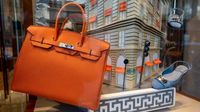In a stark turn of events for the luxury sector, LVMH Moët Hennessy - Louis Vuitton has lost its title as Europe’s largest luxury company by market capitalization, overtaken by rival Hermès. This shift comes in the wake of disappointing first-quarter sales figures released on April 14, 2025, which fell short of analyst expectations and highlighted a broader downturn in luxury goods consumption.
According to reports from Bloomberg, LVMH's first-quarter sales revealed a 5% decline in its fashion and leather goods unit, a significant drop compared to the anticipated 0.6% dip. Analysts at Bernstein now predict a decline in global luxury goods sales by 2% for the year, marking a notable shift from their earlier forecast of 5% growth.
The luxury giant, known for high-end brands such as Louis Vuitton and Christian Dior, saw its shares plummet by 8% on April 15, bringing its market capitalization down to €246 billion, just shy of Hermès’s €247 billion. This marked LVMH's most significant drop since the onset of the pandemic and its lowest share price since November 2020.
Market analysts attribute LVMH's struggles to a combination of factors, including a slowdown in demand from US consumers for beauty products and cognac, alongside weak sales in China. Jelena Sokolova, a senior equity analyst at Morningstar, noted that LVMH's larger exposure to the lower end of the luxury market contrasts sharply with Hermès’s affluent clientele, allowing the latter to weather the downturn more effectively.
The decline in LVMH's performance is particularly stark when viewed against the backdrop of a surge in optimism following Donald Trump’s election win in January 2025, which had initially buoyed luxury market stocks. However, as the administration's trade policies and fears of an impending recession have taken hold, that optimism has quickly faded.
In addition to the disappointing sales figures, LVMH's beauty retailer Sephora has also reported a slowdown, which could be attributed to the economic pressures affecting less affluent consumers. Analysts suggest that the luxury sector is facing a more challenging trading environment, with RBC analyst Piral Dadhania reducing his sales forecast for LVMH from a previously expected growth of 3% to flat growth.
Hermès, on the other hand, has managed to maintain its prestige and market position, known for its tightly controlled production and consistent price increases of 6-7% annually. This strategy has allowed Hermès to cater to a wealthier clientele and has kept demand for its iconic products, such as the Birkin and Kelly handbags, robust even in tougher economic times.
While LVMH has been a dominant force in the luxury market, its recent troubles highlight the volatility of the sector. The company is also grappling with internal changes, as CEO Bernard Arnault prepares to hand over leadership to his children, which adds another layer of uncertainty.
As the luxury market adjusts to these new realities, investors are closely monitoring the performance of major brands. Analysts have noted that while luxury goods are often seen as recession-proof, the current economic climate poses significant challenges. The decline in LVMH's stock price reflects broader concerns about consumer spending and the potential impact of trade tensions on luxury sales.
In summary, the luxury market is at a crossroads, with LVMH's recent performance serving as a cautionary tale of how quickly fortunes can change in this high-stakes industry. As consumers become more cautious, the ability of luxury brands to adapt to changing market conditions will be tested like never before.





